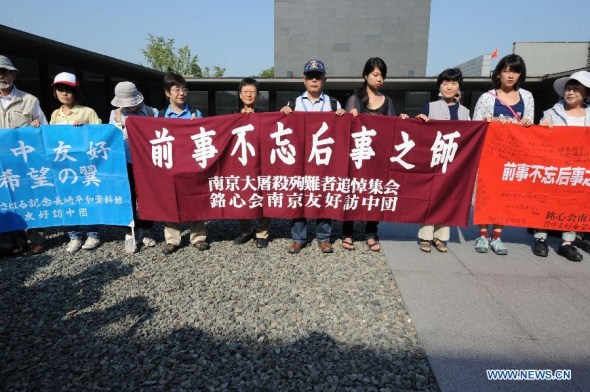

Delegates from Japan attend an assembly to mourn for victims in the tragic Nanjing Massacre at the Memorial Hall of the Victims in Nanjing Massacre by Japanese Invaders in Nanjing, capital of east China's Jiangsu Province, Aug. 15, 2013. Thursday marked the 68th anniversary of the Japanese declaration of unconditional surrender and the victory day of both Chinese people's anti-Japanese war and the world's anti-Fascist war. (Xinhua/Sun Can)
On the 68th anniversary of Japan's World War II surrender, Chinese nationwide are holding anti-war activities and memorializing those who died in the war.
In Japan, members of the cabinet, as well as dozens of lawmakers, visited the Yasukuni Shrine, a Shinto shrine that commemorates Japanese who died in the service of the Empire of Japan, including convicted war criminals.
Sixty-eight years ago, former Japanese Emperor Hirohito announced in a radio address that the country would surrender to the Allies, marking the end of China's war against Japanese aggression, as well as World War II.
In east China's Jiangsu Province, an international peace assembly was held in the provincial capital of Nanjing on Thursday.
Historians, experts and people from all walks of life gathered at the Nanjing Massacre Memorial Hall, mourned the 300,000 people who died in the massacre and prayed for world peace.
"I have different feelings every time I visit, as the relationship between China and Japan changes all the time," said Tamaki Matsuoka, a retired teacher from Japan.
"However, since relations between the two sides have slumped recently, I hope more Japanese can come to the city and take part in peaceful activities," she added.
According to the results of a survey carried out by China Daily and the Japanese non-profit think tank Genron NPO earlier this month, many Chinese and Japanese have negative opinions regarding each other's countries.
Nearly 93 percent of 1,540 surveyed Chinese said they have a negative attitude toward Japan, 28 percentage points higher than last year, while 90.1 percent of 1,000 surveyed Japanese have negative feelings toward China, higher than last year's 84.3 percent.
However, Zhu Chengshan, curator of the memorial hall, said an increasing number of young Japanese have attended memorial activities in recent years.
"Tragedies can only be avoided by facing history," Zhu said.
On the same day, Shanghai's Songhu Battle Memorial Hall received more than 1,000 visitors.
"Japanese invaders perpetrated atrocities in China in the past, but now some Japanese still visit the controversial Yasukuni Shrine. Why are some Japanese are so forgetful?" said a memorial hall visitor surnamed He.
The Battle of Songhu, also known as the Battle of Shanghai, occurred on Aug. 13, 1937. It was one of the largest and bloodiest battles during China's war against Japanese invaders.
Although Japanese Prime Minister Shinzo Abedid not visit the Yasukuni Shrine on Thursday, he reportedly offered a monetary sacrifice to the shrine, which honors 2.5 million Japanese war dead, including 14 Class-A war criminals.
For neighboring countries like China and South Korea, the shrine is a symbol of Japan's past militarism and a place that is reminiscent of the wartime atrocities committed by Japan.
"Abe and other Japanese politicians' behavior has exposed the true aim of the Japanese government. There is rising Japanese right-wing conservatism and further development of militarism," said Liu Huanxin, the president of an association that helps those who were captured or enslaved by the Japanese during World War II, as well as their children, to obtain compensation from the Japanese government.
Statistics indicate that from 1931 to 1945, nearly 40,000 Chinese laborers were enslaved in Japan, among whom more than 7,000 died.
"Abe's attitude has revealed his position. This has hurt the sensibilities of the Chinese, as well as other victims of Japan. Peaceful forces in Japan have condemned his behavior," said Wang Shaopu, a Shanghai-based researcher focusing on Asian-Pacific politics and economics.
Although Abe has claimed to have improved Japan-China relations, his actions have not matched his words, Wang said.
"According to reports from Japanese media, more people have visited the shrine this year than in previous years," said Chen Gang, a Chinese who lives and works in Tokyo.
Chen said a series of World War II-centric TV programs broadcast by Nippon Hoso Kyokai (NHK), Japan's public broadcaster, largely ignore the damage done by Japanese forces.
"They highlight the 'heroism' of the Japanese military and do not feature very much introspection," Chen said.
Chinese Foreign Ministry spokesman Hong Lei said Thursday that Japanese cabinet members' visits to the Yasukuni Shrine represent an open challenge to historical justice and the human conscience.
"The attitudes of those in power in Japan toward historical issues, including those concerning the shrine, concern the political foundation of China-Japan relations," Hong said.
Their visits represent an attempt to glorify militarism, deny past aggression and challenge the results of World War II and post-war international order, Hong said.
He urged Japanese leaders to deliver on their commitment to deeply reflect on their history and make real efforts to gain trust from the international community.
"Otherwise, Japan's relations with its neighbors will have no future," Hong said.
(Additional reporting by Xu Yang in Liaoning, Wang Wei in Shanghai, Mou Xu and Liu Min in Chongqing, Liu Baosen and Gao Jie in Shandong, Cai Yugao and Pan Ye in Jiangsu and Niu Yiying in Beijing.)
Copyright ©1999-2018
Chinanews.com. All rights reserved.
Reproduction in whole or in part without permission is prohibited.